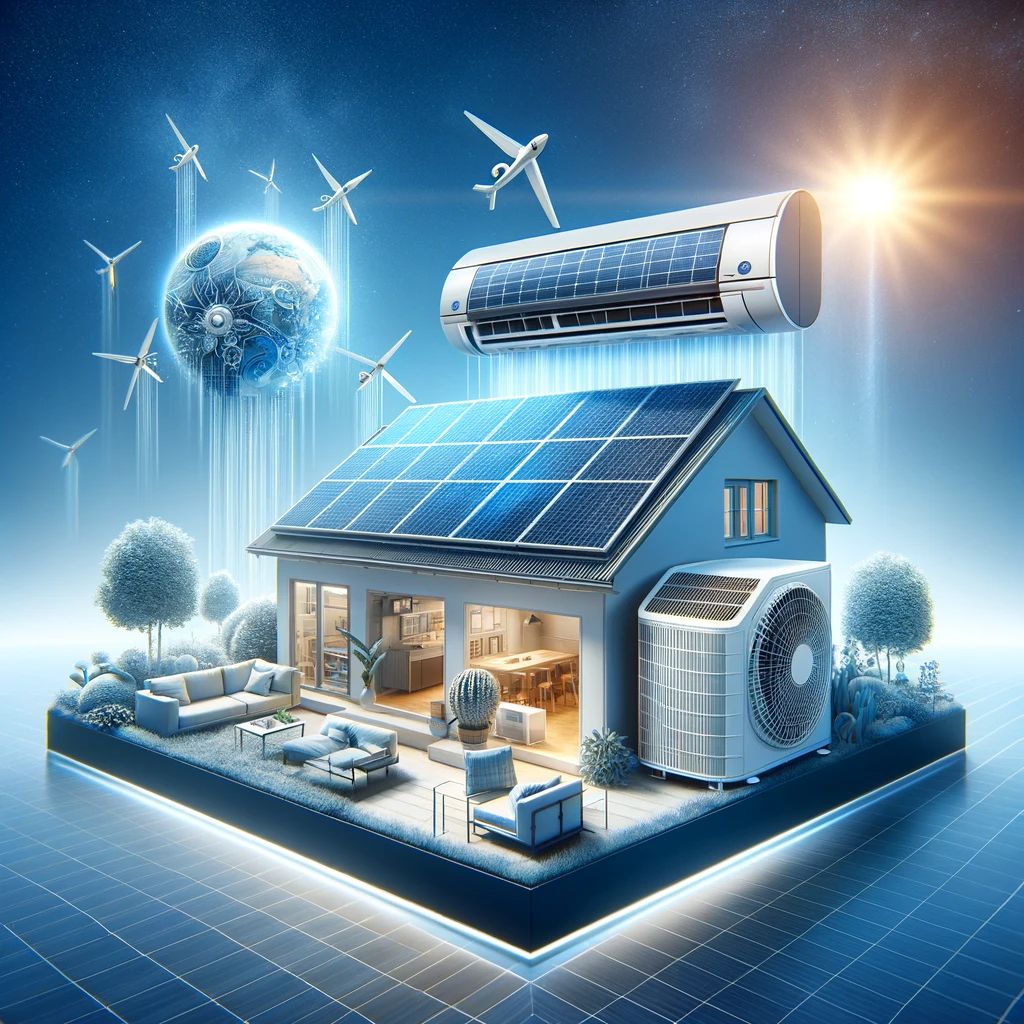Solar-powered air conditioning systems represent a convergence of environmental sustainability and technological innovation. These systems utilize solar energy to provide cooling, marking a significant advancement from traditional air conditioning systems. As global attention shifts towards renewable energy sources and eco-friendly solutions, solar-powered air conditioning emerges as a key player in the realm of energy-efficient technology.
Overview of Solar Air Conditioning Technology
Solar-powered air conditioning harnesses the sun’s energy, converting it into electricity to power cooling systems. This process involves several components, including solar panels, inverters, and batteries, working in unison to provide an efficient cooling solution. The primary appeal of these systems lies in their use of a renewable energy source – the sun. Unlike traditional systems that often rely on electricity generated from fossil fuels, solar air conditioning reduces dependence on non-renewable resources, thereby contributing to a reduction in carbon emissions.
Relevance in Modern Energy-Efficient and Eco-Friendly Solutions
The relevance of solar-powered air conditioning in today’s world cannot be overstated. With increasing awareness of environmental issues and the rising cost of traditional energy sources, these systems offer a practical and eco-friendly alternative. They not only help in reducing the carbon footprint but also align with global efforts to combat climate change. Additionally, solar air conditioning systems can lead to significant cost savings over time, despite the initial setup cost being higher compared to conventional systems. This makes them an attractive option for those looking to invest in long-term, sustainable cooling solutions.
The Shift Towards Renewable Energy
- Environmental Impact: Solar air conditioning significantly reduces greenhouse gas emissions, contributing to the global effort to mitigate climate change.
- Energy Independence: These systems provide an avenue for energy independence, reducing reliance on grid power and fluctuating energy prices.
- Long-term Savings: Despite the higher initial investment, solar air conditioning systems offer substantial long-term savings on energy bills.
- Technological Advancements: Continuous improvements in solar technology, including increased efficiency and reduced costs, make solar air conditioning more accessible and practical for a wider range of users.
Types of Solar-Powered Air Conditioning Systems
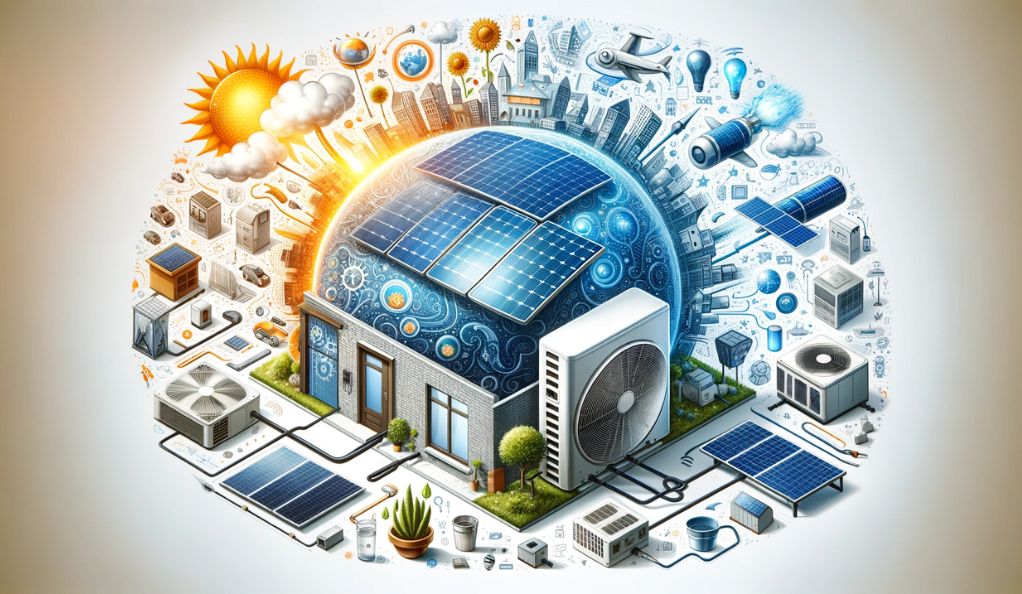
Solar-powered air conditioning systems are an innovative approach to eco-friendly cooling. These systems come in various types, each with its own set of benefits and ideal applications. Understanding the differences between these systems is key to choosing the right one for specific needs.

Solar-Powered Air Conditioning Units
Solar-powered air conditioning units directly use electricity generated from photovoltaic (PV) panels. These systems typically involve solar panels connected to an inverter, which then powers a conventional air conditioning unit.
- Benefits:
- Direct use of solar energy for cooling.
- Reduced dependence on grid electricity, lowering energy bills.
- Feasible for areas with high solar irradiance.
- Best Applications:
- Residential and commercial buildings with ample roof space for solar panels.
- Regions with consistent, strong sunlight throughout the year.
Solar Thermal Air Conditioning

Solar thermal air conditioning systems use solar energy to generate heat, which is then used for cooling through a thermal conversion process. These systems involve solar thermal collectors that absorb heat and a thermal-driven cooling system, like an absorption chiller.
- Benefits:
- Efficient in converting solar heat to cooling.
- Lower electrical requirements compared to PV systems.
- Suitable for large-scale cooling applications.
- Best Applications:
- Industrial or large-scale residential setups where cooling demands are high.
- Areas where peak cooling requirements align with peak sunlight hours.
Hybrid Solar Air Conditioning Systems
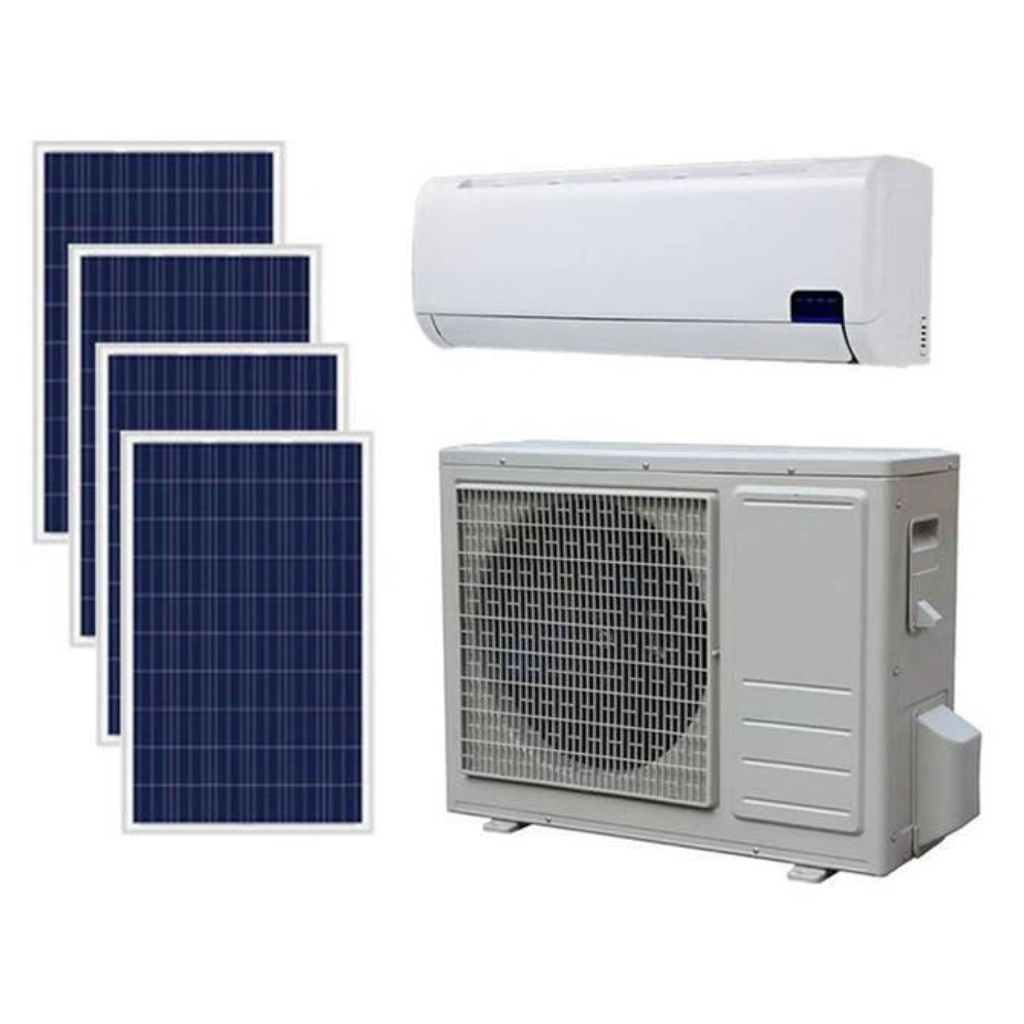
Hybrid solar air conditioning systems combine solar power with traditional energy sources. They can switch between solar energy and grid electricity based on availability, ensuring continuous operation.
- Benefits:
- Flexibility in energy use, ensuring consistent cooling.
- Greater reliability, as they are not solely dependent on solar power.
- Reduction in energy consumption and operational costs.
- Best Applications:
- Environments with fluctuating weather conditions and varying solar availability.
- Settings where continuous operation is crucial, such as hospitals and data centers.
Advanced Technologies in Solar Air Conditioning
The field of solar air conditioning has seen remarkable advancements in technology, leading to more efficient and effective cooling systems. These innovations range from passive and active cooling systems to advanced heat dissipation materials, all of which contribute to enhanced performance and energy efficiency.
Passive and Active Cooling Systems in Solar AC
Passive cooling systems in solar air conditioning rely on natural processes like convection or radiation to dissipate heat. They are designed to reduce the need for mechanical cooling, thus saving energy.
- Features of Passive Cooling Systems:
- Utilize natural air flow and heat absorption materials.
- Require minimal to no energy for operation.
- Ideal for reducing the overall energy load of the air conditioning system.
Active cooling systems, on the other hand, use mechanical methods to enhance the cooling process. These systems are more complex but offer greater control and efficiency in heat removal.
- Features of Active Cooling Systems:
- Employ components like fans or pumps to enhance heat dissipation.
- Can be powered by solar energy, making them eco-friendly.
- Provide more consistent cooling, especially in areas with high heat loads.
Advanced Heat Dissipation Materials
Recent advancements have introduced new materials with superior heat dissipation properties, improving the efficiency of solar air conditioning systems.
- Innovations in Heat Dissipation Materials:
- Phase change materials (PCMs) that absorb and release heat, stabilizing temperatures.
- Advanced thermal conductive materials that enhance heat transfer.
- New coatings and surface treatments that improve solar panel heat tolerance.
Role of Smart Monitoring and Control
Smart monitoring and control technologies play a crucial role in optimizing the performance of solar air conditioning systems. These systems use sensors and intelligent algorithms to adjust cooling based on real-time data.
- Benefits of Smart Monitoring and Control:
- Enable real-time adjustments for optimal efficiency.
- Reduce energy wastage by adapting to changing environmental conditions.
- Provide user-friendly interfaces for monitoring and managing the system.
Installation and Maintenance
The installation and maintenance of solar air conditioning systems are critical to ensure their efficient and long-lasting operation. Proper installation and regular maintenance can significantly enhance the performance and lifespan of these systems.
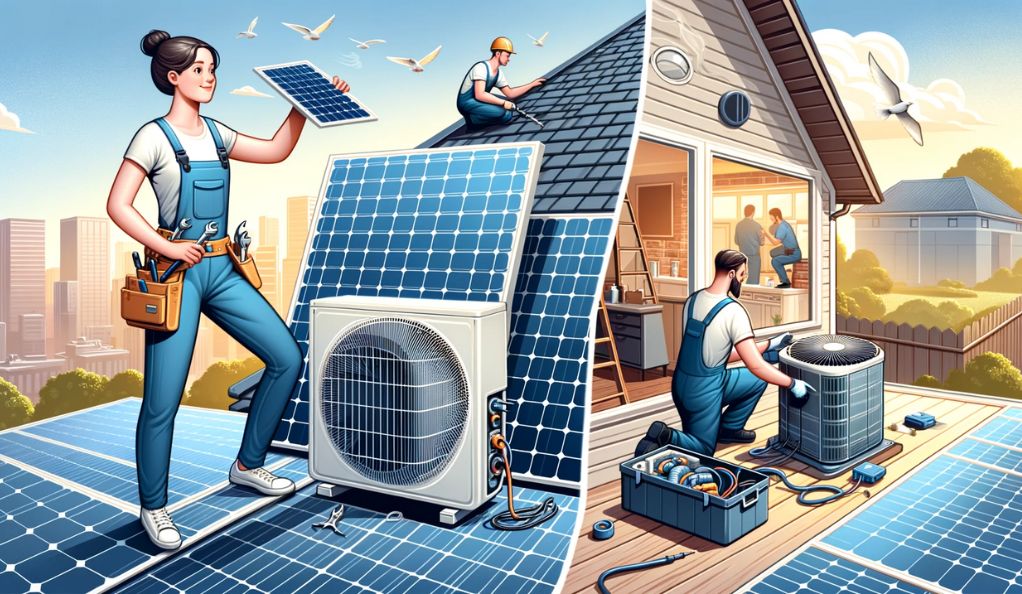
Installation Considerations
The installation of solar air conditioning systems involves several key steps and considerations to maximize efficiency and effectiveness.
- Site Evaluation:
- Assessing the location for solar panel installation, including roof structure and sun exposure.
- Considering local climate conditions to determine the most suitable type of solar air conditioning system.
- System Selection:
- Choosing the right size and type of system based on energy needs and budget constraints.
- Selecting high-quality components (solar panels, inverters, HVAC units) for better performance and durability.
- Professional Installation:
- Engaging licensed professionals for installation to ensure proper setup and compliance with safety standards.
- Coordinating with local authorities for any required permits or inspections.
Maintenance Guidelines
Routine maintenance is essential to maintain the efficiency and longevity of solar air conditioning systems.
- Regular Inspections:
- Scheduling annual inspections by qualified technicians to check system components and performance.
- Identifying and addressing any issues early to prevent larger problems and system breakdowns.
- Solar Panel Care:
- Regular cleaning of solar panels to remove dust, debris, or snow that can obstruct sunlight.
- Ensuring panels are free from shading and obstructions to maintain optimal energy absorption.
- System Component Maintenance:
- Checking and maintaining HVAC components, including filters, refrigerants, and ductwork.
- Monitoring battery health and connections for systems with energy storage capabilities.
Integration with Renewable Energy Sources
Integrating solar air conditioning systems with other renewable energy sources is a progressive step towards creating more sustainable and efficient energy solutions. This integration can enhance reliability, increase energy savings, and reduce environmental impact.
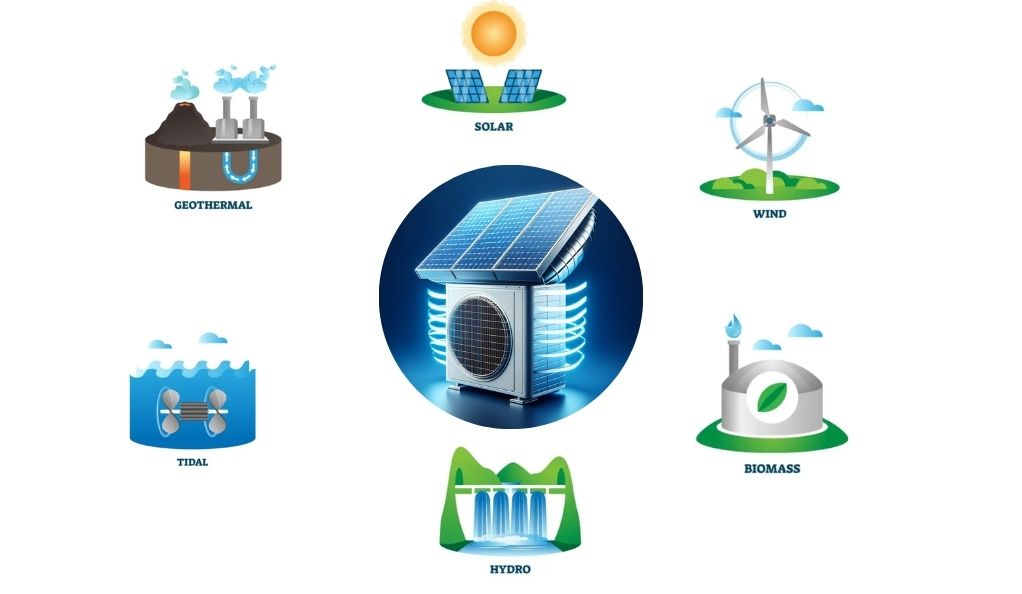
Wind Energy
Combining solar air conditioning with wind energy can provide a more consistent energy supply, as wind can complement solar energy, especially during periods of low sunlight.
- Benefits:
- Improved energy reliability, as wind can often generate power during nighttime or cloudy days when solar energy is limited.
- Potential for increased energy production, maximizing the use of renewable resources.
- Challenges:
- The need for more complex energy management systems to balance the input from both solar and wind sources.
- Higher initial setup costs due to the addition of wind turbines and related infrastructure.
Hydroelectric Power
Hydroelectric power can also be integrated with solar air conditioning systems, particularly in regions with accessible water sources.
- Benefits:
- Stable and continuous energy supply, as hydroelectric power is less variable than solar energy.
- Enhanced overall system efficiency, especially in areas with limited sunlight but abundant water resources.
- Challenges:
- Geographical limitations, as effective integration requires proximity to water sources.
- Potential environmental concerns related to water resource management and ecosystem impact.
Other Sustainable Energy Solutions
Solar air conditioning systems can also be integrated with other sustainable solutions such as geothermal energy or biomass energy systems.
- Benefits:
- Diversification of energy sources, reducing reliance on a single type of renewable energy.
- Increased overall system sustainability, leveraging the strengths of different renewable sources.
- Challenges:
- Complexity in system design and energy management to accommodate multiple energy sources.
- The need for specialized knowledge and technology to effectively integrate different renewable energy systems.
Solar Air Conditioning in Different Climates
The performance of solar air conditioning systems can vary significantly across different climatic conditions. Understanding how these systems can be adapted and customized for various environments is essential for optimal functionality and efficiency.
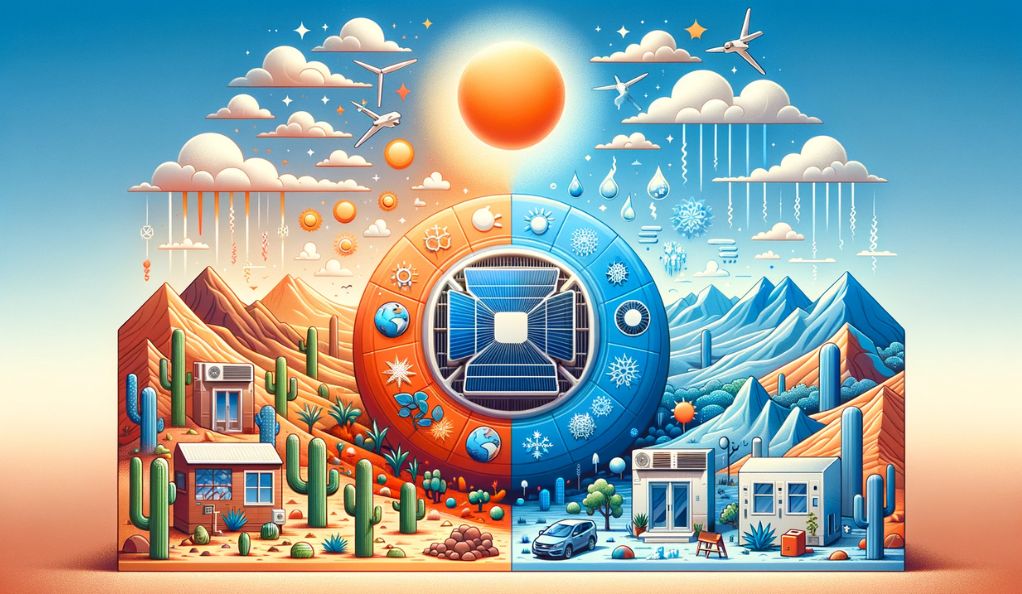
Performance in Diverse Climatic Conditions
Solar air conditioning systems face distinct challenges and opportunities in different climates, from hot and sunny regions to colder, less sunny areas.
- Hot and Sunny Climates:
- Solar AC systems are highly effective in sunny climates, with ample solar energy available for efficient operation.
- In regions with intense heat, these systems can face challenges due to overheating of solar panels, requiring efficient heat dissipation methods.
- Moderate Climates:
- In moderate climates, solar AC systems can provide consistent performance, balancing between cooling needs and solar energy availability.
- These systems can often meet a significant portion of the cooling demands using solar energy alone.
- Cold and Less Sunny Climates:
- Performance can be limited in colder, less sunny climates due to reduced solar irradiance.
- Integration with other renewable energy sources or grid power may be necessary to ensure consistent operation.
Adaptation and Customization for Extreme Conditions
Customizing solar air conditioning systems for different environmental conditions is crucial to maintain efficiency and reliability.
- In High Heat Areas:
- Implementing advanced cooling technologies for solar panels, such as active cooling systems or phase change materials.
- Utilizing hybrid systems that can switch to alternative power sources during extreme heat when solar efficiency might decrease.
- In Areas with Fluctuating Sunlight:
- Incorporating energy storage solutions like batteries to store excess solar energy for use during periods of low sunlight.
- Integrating smart control systems that adjust the operation based on available solar energy and cooling needs.
- In Cold and Cloudy Regions:
- Using solar thermal systems that are more effective in capturing diffuse solar radiation.
- Combining solar AC with other renewable energy sources, such as wind or hydroelectric power, to ensure adequate energy supply.
Conclusion
Solar-powered air conditioning systems stand at the forefront of a new era in sustainable cooling solutions. These systems represent a significant advancement in the field of renewable energy, offering a practical and environmentally friendly alternative to traditional air conditioning. Their ability to harness the power of the sun for cooling purposes aligns perfectly with the growing global emphasis on sustainability and energy efficiency.
The potential of solar-powered air conditioning systems extends far beyond their immediate environmental benefits. They play a crucial role in promoting energy-efficient lifestyles, contributing to the reduction of greenhouse gas emissions and the dependence on fossil fuels. By integrating solar energy into everyday cooling needs, these systems pave the way for a more sustainable future, where renewable energy sources become the norm rather than the exception.
Moreover, the adaptability of solar air conditioning systems to various climates and environments underscores their versatility. Whether in hot, sunny regions or colder, less sunny areas, these systems can be customized and optimized to deliver efficient cooling. This flexibility ensures that solar air conditioning can be a viable option for a wide range of geographic locations, making it a key player in the global shift towards green technology.
Solar-powered air conditioning systems are more than just an alternative cooling solution; they represent a significant step towards a sustainable and energy-efficient future. As technology continues to advance and the world becomes more conscious of environmental impacts, solar air conditioning is poised to play a pivotal role in shaping the way we cool our spaces while caring for our planet.

